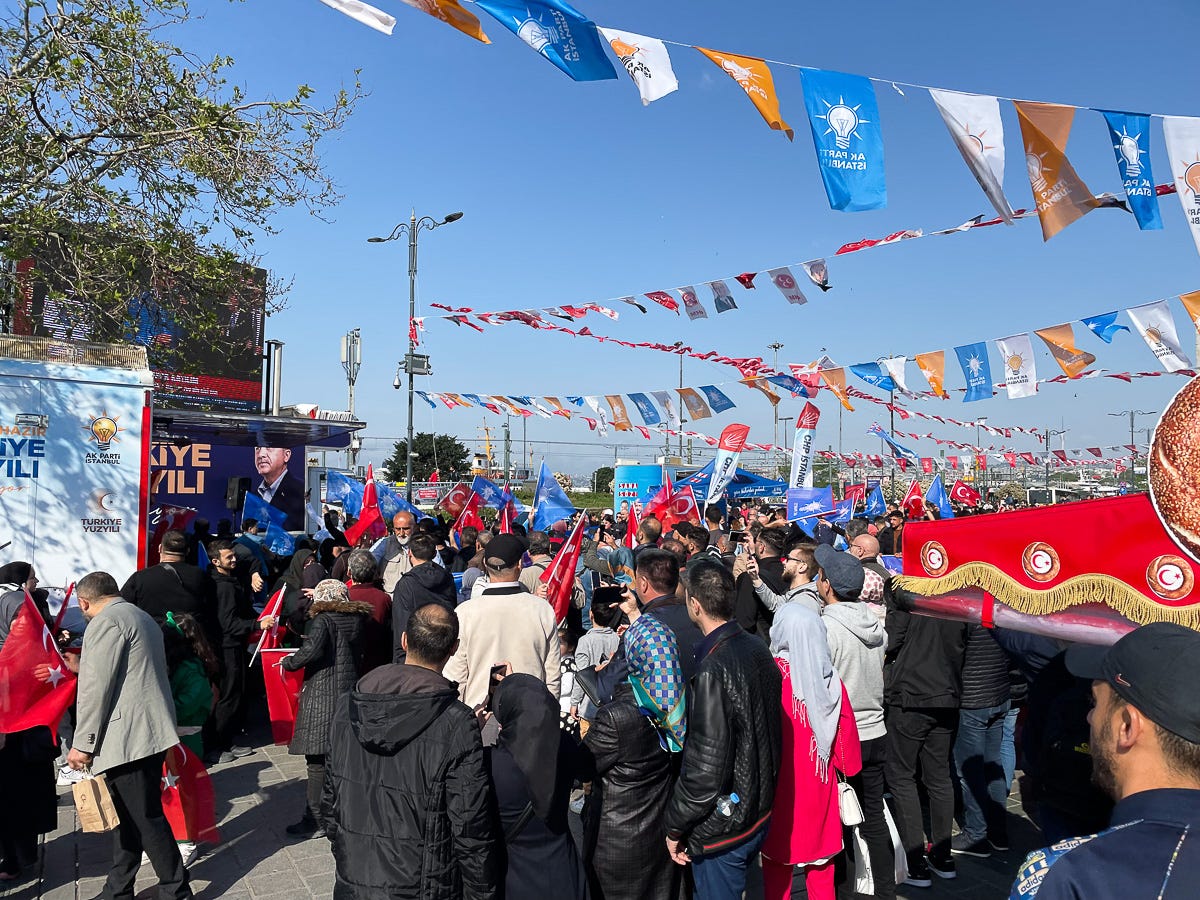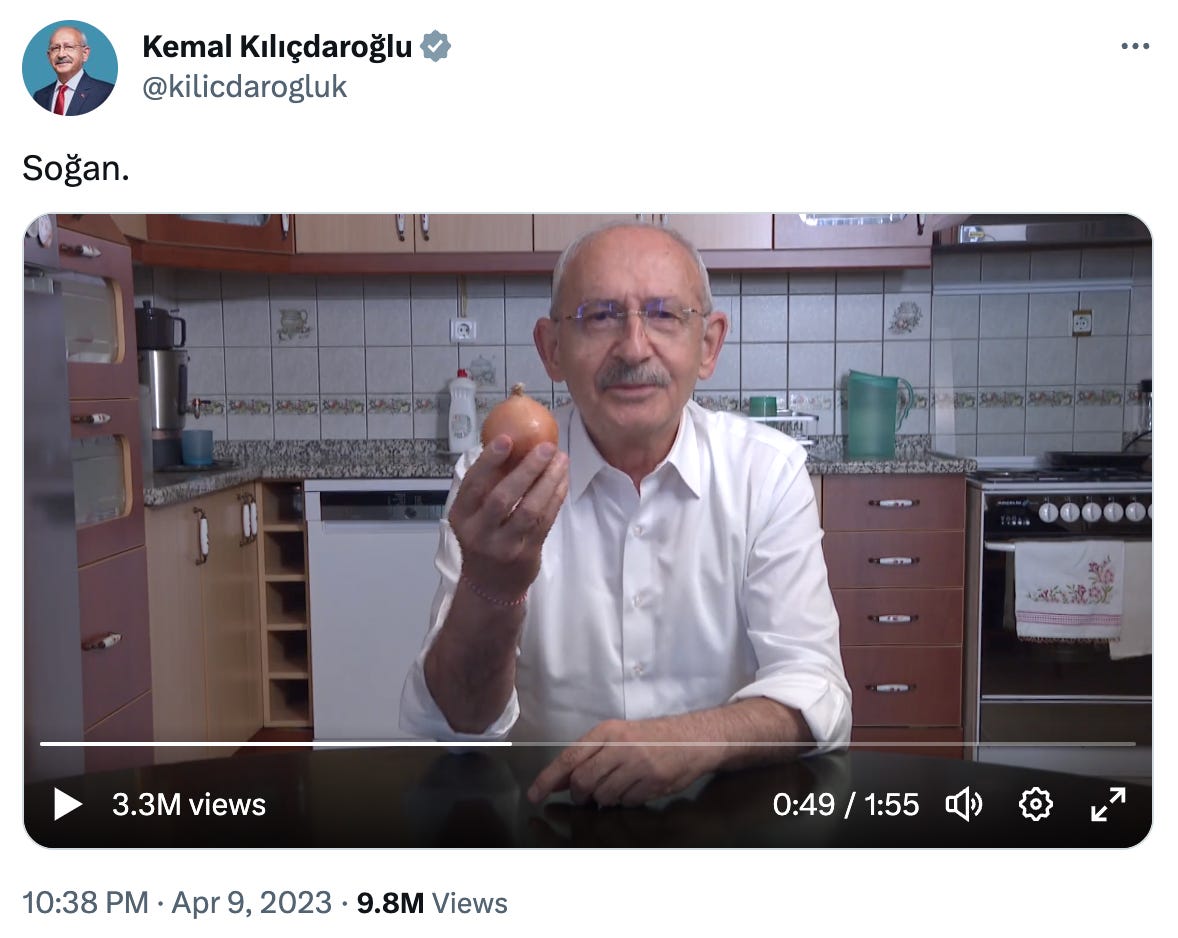An onion and an election
As polls close in Turkey, the most humble of vegetables may just topple the sitting president.
Last night, I met with a few friends at my favourite meyhane over an endless stream of mezes and a few glasses of rakı. It was a while since some of us had met, so family and general life updates were in order. But mostly, we discussed the ins and outs of today’s dual election in Turkey.
When I moved this newsletter to Substack and renamed it Meze a few months ago, it wasn’t about “branding”. Rather, it was to signify that this will be a newsletter that’s mostly - but no longer only - about food. Because meze culture isn’t simply about eating. It’s also about culture, about enjoyment, about friendship and, not least, discussions of life. And as anyone familiar with the region knows, this is inseparable from discussions about politics.
If Turkish elections aren’t of interest to you, rest assured I’ll be back with recipes and food inspiration again in a few days :)
—
The weather in Istanbul isn’t quite able to make its mind up today. Sunshine has finally returned after an unusually cold and dark start to the month of May, though it’s still interspersed by light clouds. In many ways, it’s reflective of the mood of much of the nation today. Hopeful, but not quite confident. Unsure of whether we’ll have sunshine or rain by the end of the day.
Today, 74 years to the day since what is considered Turkey’s first democratic(ish) election, Turks go to the polls in what is widely considered the most consequential election in at least a generation.
On one side, president Erdoğan, his AK Party and his coalition partners, the far-right ultranationalist MHP. On the other, an unlikely coalition of parties and personalities who have agreed on more than 3,000 policy points, but in reality are united by one thing: Removing the sitting president and his ensemble.
Last time, Erdoğan won with 53% of the vote against an opposition fielding multiple candidates. This time around, the main opposition have united around a single candidate, Mr. Kemal Kılıçdaroğlu, the leader of the CHP, the main opposition party during the entirety of Erdoğan’s reign.
A backdrop of disasters
I moved to Turkey in 2015. The story since then has been of one disaster after another. Terror attacks, a failed coup attempt, mass arrests, a collapsing currency, economic crises, COVID-19, earthquake. Over the past couple of years, sky rocketing inflation on basic goods and out-of-control property prices have left many to struggle for both food and shelter. The government was also highly criticised for its response to the violent earthquake in February, including from their own supporters.
You’d be forgiven for thinking a united opposition should be cruising to victory at this point. Indeed, I remember all too well how the support of the Norwegian governing parties collapsed in 2012, after a commission report about the 2011 terror attacks heavily criticised the authorities and police. They never recovered, and the opposition won the 2013 election in a landslide.
But, as I’ve learned over the nearly 20 years I’ve been following Turkey and its politics closely, analysing voting patterns with Western prejudice makes no sense. Economics and disaster response are but one part of the picture. Identity and tribalism (for lack of a better word) are at least as important. What’s more, more than 11 million housewives and several other groups currently receive benefits they didn’t have before. Many of them are scared of losing these – even though the opposition has promised more, not less, to most.
Meanwhile, the minimum wage has increased significantly over the last couple of years, and just last week a large number of state employees got a huge raise. The earthquake response quickly became water under the bridge, with the focus having quickly turned to the rebuilding. And in construction, Erdoğan and the AK Party’s credentials are unrivalled.
The opposition’s battles
Meanwhile, the opposition hasn’t made it easy for themselves. While they united behind Mr. Kılıçdaroğlu as their joint presidential candidate with the hopes of finishing the election in the first round (if no one reaches 50%, there’s a run-off in two weeks), his appointment didn’t happen without drama.
Mr. Kılıçdaroğlu is a 74-year-old retired bureaucrat who looks and sounds exactly like the image this description is likely to conjure. Many hoped that the opposition alliance of six parties would instead choose one of the hugely popular mayors of Istanbul or Ankara, who fared far better against president Erdoğan in opinion polls. Amongst them, Meral Akşener, leader of the nationalist IYI Party, the other significant party in the opposition alliance and a formidable figure in Turkish politics since the 1990s.
When Mr. Kılıçdaroğlu’s candidacy was launched, Ms. Akşener immediately pulled her party out of the alliance. She simply didn’t believe Kılıçdaroğlu would be able to win. In a dramatic speech, she called for the mayors of Istanbul and Ankara to challenge their leader. After what we must assume was a weekend of intense negotations, Ms. Akşener and the IYI Party returned to the fold as the two mayors (alongside the leaders of the other parties in the opposition alliance) were promised positions as Vice Presidents. Since then, the alliance and – perhaps even more importantly – the relationship between Mr. Kılıçdaroğlu and the two mayors has appeared stronger and more united than ever. An apparently win-win solution for everyone but Ms. Akşener, who saw her party immediately lose 5% in the polls.
This sort of political drama is by no means unprecedented in Turkey — or the wider Mediterranean or Middle Eastern region. But it did expose the potential difficulties of an all-embracing alliance like the opposition’s “table of six”. In addition to the social democratic CHP and right wing/nationalist IYI, the alliance includes four tiny parties, among them a conservative islamist party and two parties founded by Erdogans former prime minister and economy minister, who fell out of favour and later joined the opposition.
And in the wings, as ever, are the Kurds and their sympathisers. They’re not part of the opposition alliance, but have endorsed Mr. Kılıçdaroğlu for president, massively boosting the opposition’s hopes to win the election in the first round. In parliament, the Kurdish friendly YS Party is widely expected to hold the balance of power.
The campaign
The election campaign itself has been classically Turkish. Huge rallies, election promises that would make even populists elsewhere blush and a complete absence of debates.
The governing coalition have accused the opposition of being drunkards, going to bed with “terrorists” or joining foreign powers in a “coup” against Turkish democracy. Mr. Kılıçdaroğlu, while not refraining from heavy criticisms of the government, prefers to communicate in short, soft-spoken videos on his Twitter account. Many of them recorded in his own, humble kitchen, which looks just like any other middle or working class Turkish kitchen.
One of his most talked-about videos is about onions. Alongside cooking oil and tomato paste, onions form the backbone of Turkish cuisine. Without them, most Turks will be at a complete loss in the kitchen. Historically, it’s been so cheap that even the poorest would never have to think twice about buying several kilos in one go. In the past 18 months, however, the price has gone up more than 8 times, reaching nearly 30 TL ($1.50) per kilo in supermarkets. Simply holding up an onion is a potent image of the economic crisis and its effect on citizens
The past few days have, however, been mostly about a simple slogan. İlk turda bitirelim. “Let’s finish this in the first round”. With two minor candidates on the ballot alongside Mr. Erdogan and Mr. Kilicdaroglu, most polls suggest no candidate will reach 50% in the first round, triggering a run-off in two weeks. The pressure on the minor candidates to withdraw has been enormous, and last Thursday one of them folded. Although polling just 1–2%, the votes now up for grabs could be decisive in what’s looking like a nailbiter of a count.
But who will win?
There are a few signs that the momentum of the past few days is with Mr. Kılıçdaroğlu and the opposition. Turkish polls are notoriously unreliable, however, and the memory of the November 2015 elections, where Mr. Erdogan beat his poll numbers by 6–7%, is still fresh in memory.
At this point, it’s simply impossible to predict the outcome. We’ll have to wait and see as results start coming through this afternoon.
Confusingly to outsiders, we’ll have multiple counts, as the opposition has recruited more than half a million observers who, in addition to protecting the integrity of the voting, will follow and report on the counting of every single ballot box across the country. If the local elections of 2019 are anything to go by, expect the official count to start with a high pro-government vote, and the opposite for the opposition’s separate (and unofficial) count to start at the other end. Hopefully, the results will converge as the night progresses...






